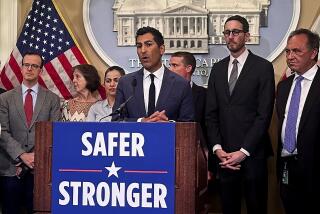Bane’s S&L; Bill Repealed Fraud Sections
- Share via
SACRAMENTO — A 1984 overhaul of state savings and loan law by Assemblyman Tom Bane (D-Tarzana) included a provision that repealed statutes designed to prevent fraud in the industry, according to a report scheduled for broadcast by a San Francisco public television station.
Moreover, Bane failed to tell lawmakers that they were repealing the anti-fraud sections when they approved the 110-page bill, according to an advance transcript of Express, a news show to be aired Wednesday by station KQED.
The bill was designed to streamline and update regulation of savings and loans and was sponsored by a major industry lobbying group and the state Department of Savings and Loans. Many of the bills introduced in the Legislature originate with special-interest lobbying and trade associations.
Bane could not be reached for comment. In the transcript, made available to The Times on Saturday, Bane dismissed the importance of the deletions, saying the removed sections were no longer relevant to the code.
Assemblyman Patrick Johnston (D-Stockton) is quoted in the transcript as saying that he was unaware “of the significance of that legislation and those deletions” and that he suspects his colleagues were unaware as well.
Johnston, who is chairman of the Finance and Insurance Committee that reviewed the Bane bill, said large trade groups representing financial institutions “propose what they say are recodifications or technical changes and, along the way, they are capable of dropping important consumer protections and anti-fraud protections. And that appears to be the case in this situation.”
Passage of Bane’s measure came as federal authorities were deregulating the savings and loan industry nationwide and the state’s financial institutions were seeking a favorable regulatory climate for the new era of competition.
Bane’s bill was sponsored by the state savings and loans department and the California League of Savings Institutions. In a letter dated April 5, 1983, David K. Milton, the league’s general counsel, said the measure’s aim was “to bring into the 1980s and 1990s an efficient, effective and flexible system of regulation for our state savings and loan associations.”
Repealed Provisions
However, according to the KQED show, the Bane bill also repealed:
* The prohibition against officers of savings and loans pocketing huge loan fees or kickbacks.
* The conflict-of-interest law forbidding savings and loan executives from selling their property to their institution.
* The ban on savings and loans making huge loans to their executives.
One former Assembly staffer familiar with the bill, who asked not to be identified, could not recall any discussion of the anti-fraud sections.
But, the source noted on Saturday, Bane’s measure was discussed for at least two years before winning passage. “It wasn’t one of those bills that was rammed through in a hurry,” the source said.
In the KQED program, Bane, chairman of the powerful Assembly Rules Committee, said the bill “deleted fraud provisions that had no bearing upon the codes anymore.”
Cites Support for Repeal
“They were supported by the savings and loan commissioner and the industry. There were no fraud provisions that I know of that were detrimental to controlling fraud,” he said during the program. Discussion of the Bane bill was only a portion of the news program, which focuses on the inner workings of the Legislature.
Bane, 75, has long been regarded as a champion of legislation on behalf of the savings and loan industry. He once ran a trade and lobbying association for the savings and loan industry and receives campaign contributions from savings and loans, banks and other financial institutions. He received $102,480 in campaign contributions from savings and loans in 1987-88, nearly 10% of the $1.1 million he raised, according to his campaign reports.
Last week it was reported that after accepting $18,000 in campaign contributions from two financial institutions early last year, Bane introduced legislation that opponents said would have aided the two firms in a pending multimillion-dollar lawsuit.
More to Read
Get the L.A. Times Politics newsletter
Deeply reported insights into legislation, politics and policy from Sacramento, Washington and beyond. In your inbox twice per week.
You may occasionally receive promotional content from the Los Angeles Times.







